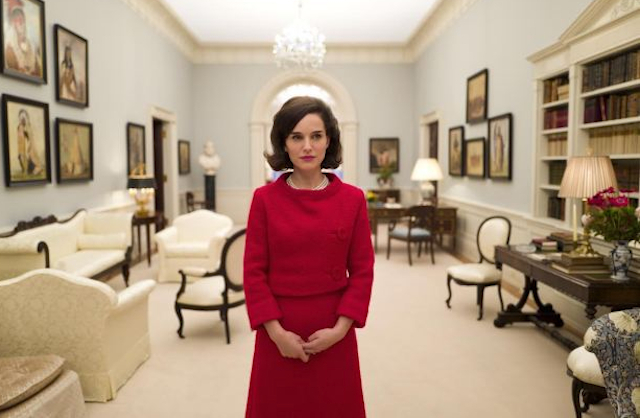CHICAGO – Patrick McDonald of HollywoodChicago.com appears on “The Morning Mess” with Dan Baker on WBGR-FM (Monroe, Wisconsin) on March 21st, 2024, reviewing the new streaming series “Manhunt” – based on the bestseller by James L. Swanson – currently streaming on Apple TV+.
Natalie Portman Embodies a Magnificent ‘Jackie’
 Rating: 5.0/5.0 |
CHICAGO – Capturing one of the most familiar woman of the last fifty years would seem impossible, except when focusing on one of the defining moments of her life. “Jackie” reveals Jacqueline Kennedy during the time of her husband John’s assassination, and when the nation lost a president.
This biographical portrait is superior cinematic form, a combination of stylistic close-up work and funereal atmosphere by Pablo Lorrain, one of the most creative directors working today. The camera never blinks while following Natalie Portman as the title character, in a peak career performance. Jackie is a victim of Post Traumatic Stress Syndrome, and the story follows her through the grim week of being witness to her husband’s murder, her inconvenience – to the newly powerful – of being responsible for his funeral and the emotional haze of having to live on. The character of Jackie is defining the beginning of the end for America, the victim of hatred and violence which have evolved to the norm.
Jacqueline Kennedy (Natalie Portman) is allowing her first interview with “The Journalist” (Billy Crudup) one week after her husband, John F. Kennedy (Caspar Phillipson), had been assassinated in November of 1963. She begins to remember the events as it unfolds in her head – part surreal, part earnest and profiled in courage.

Natalie Portman is Jacqueline Kennedy in ‘Jackie’
Photo credit: Fox Searchlight Pictures
She is next to her husband as he dies of a bullet to the brain on an American street. She suffers through the elaborate funeral plans, while new presidential power essentially wants her out of the way. She seeks solace and answers from her brother-in-law Bobby (Peter Sarsgaard) and aide Nancy Tuckerman (Greta Gerwig). The nation turns its lonely eyes to her.
Natalie Portman provides the performance of a lifetime, interpreting Jackie Kennedy’s life in close-up emotional turmoil. Her face – equally as beautiful as the former first lady she is portraying – is a confused mask of shock, sadness and disbelief. She brings the voice of the icon to life, framed by flashbacks to a more formal Jackie giving a TV White House tour, and then forward to the 1963 Jackie, as she bitterly relates her desperation to a somber reporter. It is the finest performance by an actress in 2016, and most likely will be recognized as such.
The hot director Pablo Larrain was an interesting choice to translate the material – from a tight and heartfelt script written by Noah Oppenheim. Larrain is from Chile, and chose to use the character of Jackie as a symbol for the American empire at the time of the assassination. The delicacy of trust in our government was shattered, they couldn’t even protect a president. And that shattered trust is embodied by a delicate and intelligent woman, brought into the role as mourner-in-chief, trying to heal a nation while carving her own deep scars.

The Blood of a Nation Stains the Fashionable ‘Jackie’
Photo credit: Fox Searchlight Pictures
The landscape that Larrain and his production designed was exquisite, without any distractions regarding a “period” movie. Filmed in Paris and Washington, D.C., Larrain used the French landscape as a hyperbolic representation of 1963 Washington, while using the streets of real D.C. as a somber final march for the First Widow. The assassination itself was uniquely revealed. At the time, Jackie remarked that she was looking forward – on that warm Dallas, Texas day – of getting to the coolness of an underpass that was ahead of the motorcade. That’s when the shots rang out. As the limousine speeds to Parkland Hospital in the film, it goes beneath a series of underpasses.
A very poignant element in “Jackie” is the use of the song “Camelot” at key moments. That Broadway tune is one of overripe bombast, sung with bizarre fervor by actor Richard Burton, and became a symbol of the John F. Kennedy years, because Jackie couldn’t think of anything more “appropriate” during that first interview. “A law was made a distant moon ago here…”
 | By PATRICK McDONALD |


